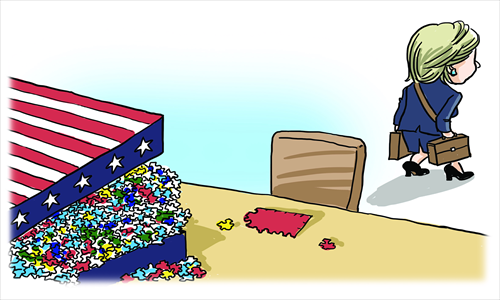Secretary of state leaves legacy of instability in Asia-Pacific

When US Secretary of State Hillary Clinton finally leaves office this month, the US foreign policy she helped shape will have changed so much, yet so little.
To recover the US image deficit incurred during the Bush years, the celebrity secretary of state has sought to "reconnect" with other countries by traveling to 112 countries.
She "reset" relations with Moscow; bargained hard with Beijing; removed dictators - though selectively and sometimes reluctantly through coalition efforts and social media; and rewired relations with US allies who were somewhat forgotten during Bush's "war on terror."
Not everything, however, has been turned to gold by this energetic US globetrotter. Some even resulted in blowback, such as the tragic deaths of four US diplomats in Libya in September 2012.
Others, like the Egyptian revolution, are now haunting Washington after popular elections carried Islamists to power. It is not clear if Washington's anti-status quo policy, whose current target is Syria, is for the long-term interests of anyone.
Between her visible accomplishments and failures are vast gray areas. Clinton's charm, for example, has had virtually no effect on the enduring Israeli-Palestinian conflict. Meanwhile, the US has gotten nowhere in dealing with the Iranian nuclear issue, but has allowed itself to be constrained by right-wingers in both Israel and the US.
Indeed, the Obama-Clinton foreign policy team was totally unprepared for the Israeli scholar Uri Bar-Joseph's brilliant and provocative treatise in Foreign Affairs, 25 October 2012 that Israel should trade its nukes for its own security as well as the region's. Hillary's "smart" diplomacy obviously has a long way to go in order to become wiser, more innovative and substantive.
Clinton's policies toward Russia and China have, too, been problematic at best. In dealing with the two largest powers on the Eurasian continent, she is known for her blunt rhetoric: "despicable" regarding Russia and China's Syria policy and China's "fool's errand" against history.
Regardless, Clinton actually started with a very conciliatory posture: "reset" with Russia and claiming to be on the "same boat" as China.
The first three years of reset yielded some tangible results: a new Strategic Arms Reduction Treaty and Russia's WTO entry. This "honeymoon," however, ran out of gas when Washington became critical of the December 2011 Duma election, and ultimately Vladimir Putin's swapping power with Dmitry Medvedev, again, in early 2012.
Compared with the three-year reset with Russia, Clinton's China policy roller-coastered within the very first year.
Her use of the Chinese "same-boat" aphorism in February 2009 was still resonating across the Pacific when the course suddenly reversed.
At the Copenhagen climate talks in December 2009, the secretary of state tossed around a $100-billion pledge of international assistance for developing states.
The real intention of the "offer" was to undermine China's "common but differentiated responsibilities" stance, and to isolate China, publicly and forcefully, from both developed and developing nations.
In the next few years, such high-profile confrontations with China were to recur many times: Google incident, $6-billion arms sales to Taiwan, Obama's meeting with the Dalai Lama, the South China Sea and Diaoyu Islands disputes, and so on.
The US "pivot" to Asia-Pacific, officially unveiled in Clinton's 2011 Foreign Policy piece, is largely geostrategic and militarily oriented toward China.
As the "super" secretary of state leaves office, East Asia has become more tense and unpredictable, if not necessarily more dangerous, than it was during the good old days of the Bush administration.
At the end of the day, there is a quite discernible division of labor between the Nobel Peace Prize winning president who favors drones, covert actions and target killing on one hand, and the outgoing and tireless "head of state" on the other.
That said, a working, sustainable, and effective foreign policy requires much more than perky photo ops and an "Amazing Race" style of global hopping, which set Clinton apart from others, for better or worse.
The author is a senior fellow of the Shanghai Association of American Studies. opinion@globaltimes.com.cn
Related article: Clinton's strategic choices put successor in tough position